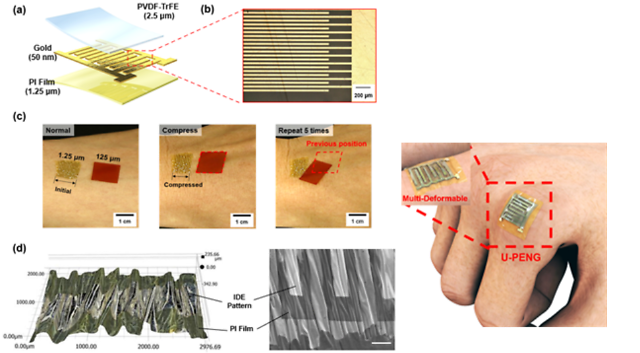
[Courtesy of Daegu Gyeongbuk Institute of Science & Technology]
Piezoelectric generators convert mechanical energy such as friction, vibration, and physical pressure into electricity. Along with photovoltaic generators that create electricity using strong light, piezoelectric generators are regarded as one of the next-generation energy harvesters that can be attached to anywhere including the surface of mechanical parts and bodies of humans and animals.
As demands for remote medical systems and wearable devices have increased, piezoelectric generators have garnered attention because they can produce energy from everyday body movements and supply electricity to power sensors that monitor biological information. However, the current piezoelectric generators are bulky and are made using harmful substances such as lead-zirconate-titanate.
A research team led by Lee Sung-won, a chemical physics professor at Daegu Gyeongbuk Institute of Science & Technology (DGIST), developed an ultrathin piezoelectric generator that can efficiently collect energy from small body movements. The new device made of polyvinylidene difluoride trifluoroethylene (PVDF-TrFE), a highly non-reactive thermoplastic fluoropolymer, turned on a light-emitting diode (LED) using energy collected from body movements. The energy efficiency was 18.85 percent, about ten times higher than the conventional devices.
The new device can produce energy regardless of the condition of the surface including the curved ones. It showed constant performance even after more than 10,000 times of deformation. The four micrometer-thick generator adheres to human skin without making the wearer feel uncomfortable. A micrometer is one-millionth of a meter.
"This research has significant potential to replace heavy and hard batteries with brand new devices capable of supplying power to sensors that measure biological signals for a long period using energy generated from subtle human body movements," DGIST researcher Lee said in a statement.


